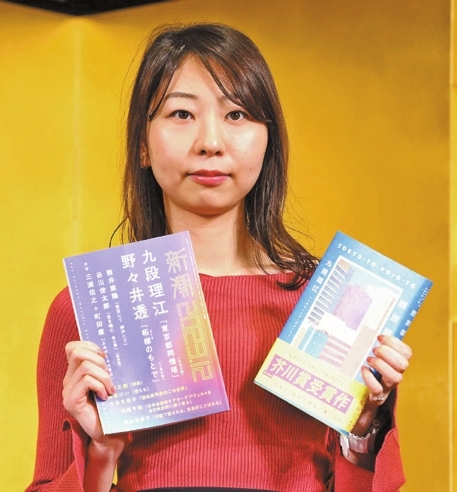
Rie Kudan, the 33-year-old winner of Japan’s top prize for literature, revealed last Wednesday that she used ChatGPT to write a portion of her book. Kudan won the prestigious Akutagawa Prize for her sci-fi novel “The Tokyo Tower of Sympathy,” which centers around a high-rise prison tower and contains themes surrounding AI. Judges reportedly called Kudan’s novel “almost flawless.” The Akutagawa Prize is Japan’s top prize for pure literature, and is awarded semiannually to emerging writers. The related Naoki Prize goes to established authors of popular fiction. It’s a huge deal, and the winners of these prestigious awards typically receive tremendous amounts of media attention. In her acceptance speech, Kudan revealed that a portion of the book had been written by ChatGPT. “This is a novel written by making full use of a generative AI like ChatGPT, and probably about 5% of the whole text is written directly from the generative AI,” Kudan said, according to The Japan Times. “I would like to work well with them to express my creativity.” The Japan Times reported Friday that the reaction on social media was swift and harsh, with many people expressing concern about what the future of literature will be if AI is allowed to compete for top awards. The use of generative AI in creative fields is still highly controversial, in part because such systems are trained on a massive corpus of other authors’ work. AI systems are known to regurgitate texts they were trained on wholesale, including personal information from real people scraped from the internet. Some observers noted that Kudan’s book contains sections that are meant to be responses generated by an AI, and argued that if ChatGPT was responsible for those portions of the book, that would be more defensible. Kudan’s publisher did not respond to a request for comment sent by The Japan Times. Kudan’s novel is set in an imagined near future where AI has become an integral part of daily life. It follows the story of Sara Makina, an architect who builds a tower in a Tokyo park designed to offer a place where criminals are rehabilitated and explores her discomfort with society’s tolerance towards those who break the law. Outside of her literary work, Kudan says she often plays around with AI and uses the technology to share thoughts that she “can never talk to anyone else about.” Admitting to using it in her writing, apparently, wasn’t one of them. Kudan added that she hopes to maintain “good relationships” with the tech and use it to “unleash my creativity” with it going forward, according to AFP. In 2022, the Colorado State Fair’s fine arts competition was embroiled in controversy when a prize in its “digitally manipulated photography” prize was given to a piece created in part with Midjourney, an AI-powered image-generating tool. Then last year, an artist turned down their prize from the Sony World Photography Awards because their prize-winning photograph wasn’t actually a photograph at all, but rather a digital image made using the AI program DALL-E 2.(SD-Agencies) Words to Learn 相关词汇 【照搬】 zhào bān regurgitate repeat what you have heard without thinking about it 【有争议的】 yǒu zhēngyì de controversial causing disagreement or discussion 33岁的日本最高文学奖得主九段理江上周三透露获奖作品的部分是她使用 ChatGPT 撰写的。 九段凭借科幻小说《东京同情塔》获得了著名的芥川龙之介奖,该小说围绕一座高层建筑中的监狱展开,主题与人工智能有关。据报道,评委称九段的小说“几乎完美无瑕”。芥川奖是日本纯文学奖中的最高奖项,每半年颁给一位新锐作家。而相应的直木奖则颁发给知名的通俗小说作家。该奖影响巨大,获奖者通常会受到媒体的广泛关注。 九段在获奖感言中透露,书中有一部分内容是由 ChatGPT 撰写的。《日本时报》引用九段的原话说:“我的写作过程充分利用了ChatGPT 这类生成式人工智能,全文大概有5%直接由人工智能写成。我希望能很好地利用人工智能表达创意。” 据《日本时报》周五报道,社交媒体上的反应迅速而严苛,许多人担心,如果允许人工智能角逐最高奖,文学的未来将走向何方。在创作领域使用生成式人工智能仍存在很大争议,部分原因是这类系统是利用其他作家的大量作品语料训练出来的。 众所周知,人工智能系统会全盘照搬用来训练它们的文本,包括从互联网上搜罗的真实个人信息。 一些观察家注意到,九段书中部分内容是人工智能生成的回复,他们认为,如果ChatGPT只是贡献了这部分内容,那么这个奖拿得就理直气壮。九段的出版商没有回应《日本时报》的置评请求。 小说以想象中的不远的未来为背景,那时人工智能已成为日常生活不可或缺的一部分。小说中,建筑师牧菜在东京一个公园里建了一座塔,用来为罪犯提供一个改造场所。故事还探讨了牧菜对社会宽容违法者的态度感到不适。 九段说,文学创作之外她也常常使用人工智能,对这种技术工具分享她“永远无法与他人倾诉”的想法。显然,这和她使用人工智能辅助写作是两码事。据法新社报道,九段补充说,她希望与这项技术保持“良好的互动”,并在未来继续利用它“释放创造力”。 2022年,美国科罗拉多州博览会的美术比赛因其“数字艺术类”获奖作品部分由人工智能图像工具Midjourney生成而引发争议。去年,一位艺术家主动拒绝了索尼世界摄影大赛的奖项,因为他的获奖作品实际上不是照片,而是使用人工智能程序DALL-E 2生成的数字图像。 (Translated by Debra) | 
